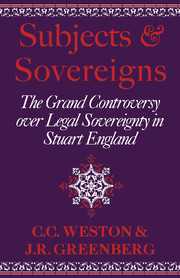Book contents
- Frontmatter
- Contents
- Dedication
- Preface
- 1 The shift in political thought
- 2 The keeper of the kingdom
- 3 The new age of political definition
- 4 That ‘Poisonous Tenet’ of co-ordination
- 5 The curious case of William Prynne
- 6 The idiom of restoration politics
- 7 Co-ordination and coevality in exclusion literature
- 8 The law-makers and the dispensing power
- Appendix: Co-ordination and resistance at the Revolution
- Notes
- Bibliography
- Index
8 - The law-makers and the dispensing power
Published online by Cambridge University Press: 08 October 2009
- Frontmatter
- Contents
- Dedication
- Preface
- 1 The shift in political thought
- 2 The keeper of the kingdom
- 3 The new age of political definition
- 4 That ‘Poisonous Tenet’ of co-ordination
- 5 The curious case of William Prynne
- 6 The idiom of restoration politics
- 7 Co-ordination and coevality in exclusion literature
- 8 The law-makers and the dispensing power
- Appendix: Co-ordination and resistance at the Revolution
- Notes
- Bibliography
- Index
Summary
To Bishop Burnet, the sudden fall of James II was one of the strangest catastrophes in history: ‘A great king, with strong armies and mighty fleets, a great treasure and powerful allies, fell all at once, and his whole strength, like a spider's web, was … irrecoverably broken at a touch.’ Certainly the breakdown of royal authority was rapid when it came and the contrast startling between the king's position on the eve of the Glorious Revolution and his involuntary exile in France by the end of 1688. Yet the change in the ideological sphere was long in the making. Ever since the civil war the Stuart kings and their supporters had adhered to one view of the kingship, while many Englishmen – very probably a majority of the political nation – adhered to another, these views encompassing very different versions of legal sovereignty. Should the later Stuart kings embark upon patently unpopular policies, dependent for their execution on a prerogative exercised independently of the two houses, difficulties must accumulate that were potentially overwhelming. Essentially, this is what happened. James II's reign shattered the good will displayed towards the monarchy after the exclusion crisis and the abortive Monmouth rebellion, replacing it with a disaffection that hardened into opposition with the events of 1688. The catalyst was the king's Catholicizing policy, forwarded by means of the controversial dispensing power; and it is by no means clear which contributed more to the coming of the Revolution.
- Type
- Chapter
- Information
- Subjects and SovereignsThe Grand Controversy over Legal Sovereignty in Stuart England, pp. 222 - 260Publisher: Cambridge University PressPrint publication year: 1981



